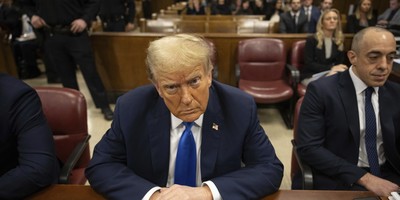There are still nearly two years left in Barack Obama's presidency, but historians looking back on his record in foreign policy will surely identify one costly error: his refusal to follow through on the implied threat in stating that the Syrian regime's use of chemical weapons would be a "red line."
That statement was made in a press conference on Monday, Aug. 20, 2012. The president was not scheduled to appear; press secretary Jay Carney said, "Looks like there's a surprise guest here." After fielding questions on other topics (Missouri Senate candidate Todd Akin, Mitt Romney's attack ads and tax returns, friendly fire deaths in Afghanistan) Obama responded to NBC's Chuck Todd's question on whether he envisioned using U.S. military to keep Syria's chemical weapons in safekeeping.
"We have been very clear to the Assad regime, but also to other players on the ground, that a red line for us is we start seeing a whole bunch of chemical weapons moving around or being utilized," Obama said.
"We have communicated in no uncertain terms with every player in the region that that's a red line for us and that there would be enormous consequences if we start seeing movement on the chemical weapons front or the use of chemical weapons." After that question, the press conference was over.
This was one year and two days after Obama said, "the time has come for President Assad to step aside." Which, of course, he didn't do and, two-and-a-half years later, hasn't done.
It was also three months after Republican presidential candidate Mitt Romney called for arming Syrian opposition groups and one week before the scheduled opening of the Republican National Convention.
And one month after U.S. intelligence agencies detected signs that the Assad regime was moving chemical weapons out of storage, according to a May 2013 story by the well-sourced Peter Baker and three New York Times colleagues.
Recommended
Perhaps presidential politics was on Obama's mind. Four days after the press conference, Romney said he would send troops to Syria to prevent the spread of chemical weapons. Obama may have communicated his "red line" -- which seemed to suggest similar action -- to pre-empt a Republican attack.
Or perhaps, as the Times story suggests, he spoke out of concern that Israel might take action. It reported that Denis McDonough, then-deputy national security adviser, convened a "frantic series of meetings" on the weekend of Aug. 18-19 on the issue where it was decided that Obama would address the issue publicly.
Hence his surprise appearance in the pressroom. But the Times also reported that "red line" was "unscripted and that some advisers were surprised he uttered those words." But he apparently decided not to take the words back. On the day following the press conference, spokesman Josh Earnest said that "use or proliferation" of chemical weapons "would be very serious, and it would be a grave mistake."
If Obama wanted to protect against political attacks, he succeeded. Syria was mentioned 28 times in the Oct. 22 foreign policy debate with Romney, in which Obama held his own.
But after he was re-elected, intelligence agencies reported chemical weapons attacks in Syria in December 2012 and March 2013. An April letter to senators acknowledged that U.S. intelligence thought the Syrian regime was using chemical weapons "on a small scale."
In an April 30 press conference, Obama shifted his emphasis, saying that chemical weapons use "would be a game-changer not simply for the United States but for the international community." In September, after it became clear Syria was using chemical weapons, Obama shifted further, saying, "I didn't set a red line. The world set a red line."
Shortly afterward the red line vanished, as Obama ruled out military action and accepted Vladimir Putin's offer to supervise removal of Syrian chemical weapons. But the damage was done. "The president bungled the language," concluded longtime Washington Post diplomatic reporter Glenn Kessler. "He made it appear as if he was denying he had called it a red line, when that obviously was not the case."
Unfortunately, bungling of language has consequences. Government leaders use words like "red line" to mean that grave consequences -- including military action -- will follow if the line is crossed. Obama's failure to back up his "red line" statement with such action has undermined America's credibility. That's a problem for America -- and the world -- until Jan. 20, 2017.

























Join the conversation as a VIP Member